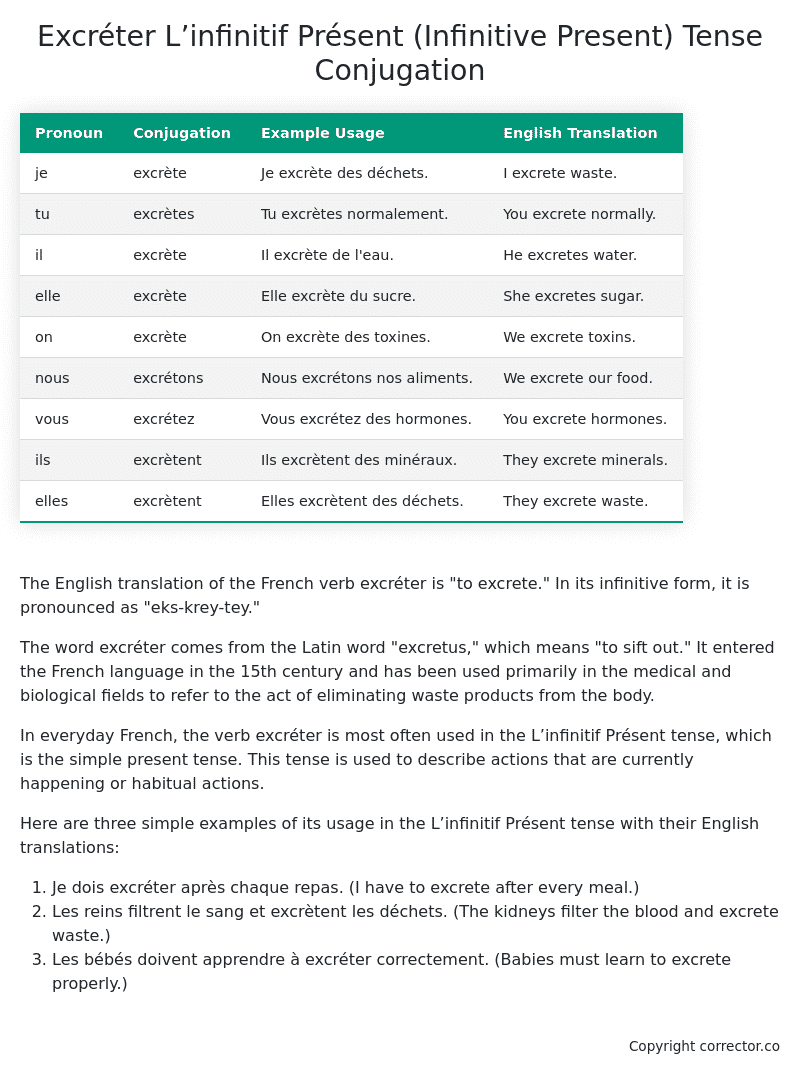L’infinitif Présent (Infinitive Present) Tense Conjugation of the French Verb excréter
Introduction to the verb excréter
The English translation of the French verb excréter is “to excrete.” In its infinitive form, it is pronounced as “eks-krey-tey.”
The word excréter comes from the Latin word “excretus,” which means “to sift out.” It entered the French language in the 15th century and has been used primarily in the medical and biological fields to refer to the act of eliminating waste products from the body.
In everyday French, the verb excréter is most often used in the L’infinitif Présent tense, which is the simple present tense. This tense is used to describe actions that are currently happening or habitual actions.
Here are three simple examples of its usage in the L’infinitif Présent tense with their English translations:
- Je dois excréter après chaque repas. (I have to excrete after every meal.)
- Les reins filtrent le sang et excrètent les déchets. (The kidneys filter the blood and excrete waste.)
- Les bébés doivent apprendre à excréter correctement. (Babies must learn to excrete properly.)
Table of the L’infinitif Présent (Infinitive Present) Tense Conjugation of excréter
| Pronoun | Conjugation | Example Usage | English Translation |
|---|---|---|---|
| je | excrète | Je excrète des déchets. | I excrete waste. |
| tu | excrètes | Tu excrètes normalement. | You excrete normally. |
| il | excrète | Il excrète de l’eau. | He excretes water. |
| elle | excrète | Elle excrète du sucre. | She excretes sugar. |
| on | excrète | On excrète des toxines. | We excrete toxins. |
| nous | excrétons | Nous excrétons nos aliments. | We excrete our food. |
| vous | excrétez | Vous excrétez des hormones. | You excrete hormones. |
| ils | excrètent | Ils excrètent des minéraux. | They excrete minerals. |
| elles | excrètent | Elles excrètent des déchets. | They excrete waste. |
Other Conjugations for Excréter.
Le Present (Present Tense) Conjugation of the French Verb excréter
Imparfait (Imperfect) Tense Conjugation of the French Verb excréter
Passé Simple (Simple Past) Tense Conjugation of the French Verb excréter
Passé Composé (Present Perfect) Tense Conjugation of the French Verb excréter
Futur Simple (Simple Future) Tense Conjugation of the French Verb excréter
Futur Proche (Near Future) Tense Conjugation of the French Verb excréter
Plus-que-parfait (Pluperfect) Tense Conjugation of the French Verb excréter
Passé Antérieur (Past Anterior) Tense Conjugation of the French Verb excréter
Futur Antérieur (Future Anterior) Tense Conjugation of the French Verb excréter
Subjonctif Présent (Subjunctive Present) Tense Conjugation of the French Verb excréter
Subjonctif Passé (Subjunctive Past) Tense Conjugation of the French Verb excréter
Subjonctif Imparfait (Subjunctive Imperfect) Tense Conjugation of the French Verb excréter
Subjonctif Plus-que-parfait (Subjunctive Pluperfect) Tense Conjugation of the French Verb excréter
Conditionnel Présent (Conditional Present) Tense Conjugation of the French Verb excréter
Conditionnel Passé (Conditional Past) Tense Conjugation of the French Verb excréter
L’impératif Présent (Imperative Present) Tense Conjugation of the French Verb excréter
L’infinitif Présent (Infinitive Present) Tense Conjugation of the French Verb excréter (this article)
Struggling with French verbs or the language in general? Why not use our free French Grammar Checker – no registration required!
Get a FREE Download Study Sheet of this Conjugation 🔥
Simply right click the image below, click “save image” and get your free reference for the excréter L’infinitif Présent tense conjugation!

Excréter – About the French L’infinitif Présent (Infinitive Present) Tense
Forming the Infinitive Present
Common Everyday Usage Patterns
As a Verb’s Dictionary Form
After Modal Verbs
As an Imperative
In Infinitive Clauses
Interactions with Other Tenses
Present Tense
Future Tense
Conditional Tense
Passé Composé
Imperfect Tense
Subjunctive and Conditional Moods
Summary
Want More?
I hope you enjoyed this article on the verb excréter. Still in a learning mood? Check out another TOTALLY random French verb conjugation!


